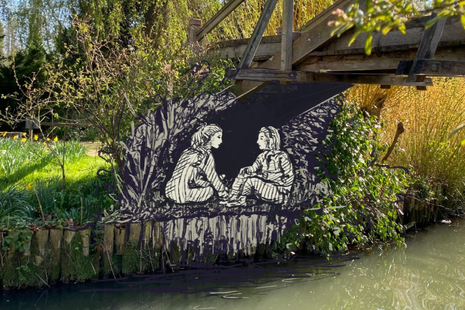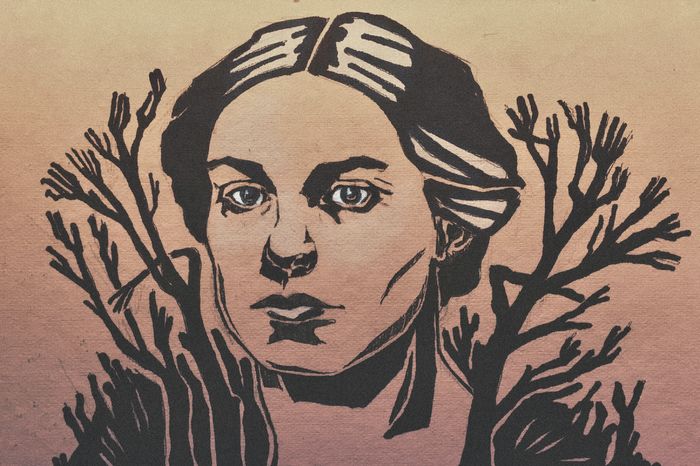A Cambridge childhood felt through Period Piece
Ryan Vowles comes to know the artist Gwen Raverat through her perfect childhood memoirs

Newnham Grange is a beautiful grey-brick house on Silver street, on the west side of the Cam, looking towards the backs. It is now the centre of Darwin College, the rooms upstairs being the Master’s study and Fellow’s combination room, but it was once a family home. Gwen Raverat, the granddaughter of Charles Darwin, writes of this family life in her childhood memoir, Period Piece. Since reading it, I feel as though I grew up in Newnham Grange. Like Raymond Mortimer of the Sunday Times, “I have never read a more enjoyable book of childhood memoirs”.
“She reflects on her youth as one tortured by society: “of course I wanted, still more than anything in the world, to be a man””
I find myself feeling that I know Gwen personally, which is a triumph of writing for someone born in the alien world of Victorian England. Her father George was a Trinity astronomer, her cousin was Vaughan-Williams, and yet she reveals herself as a rebel from the start. Throughout her life, she railed against the rigidity of gender, class, and expectation in 19th century Cambridge. Her mother had been an advocate of independence and education for women and was supposedly the first woman in Cambridge to own a bicycle. Nonetheless, and despite her frustrations, Gwen’s memoirs are overflowing with love. She wrote her memoir at 62, and through this love we share in her nostalgia for her early years.
Unsurprisingly, the upheaval of social norms was a focus for Gwen as she reflected on the 1890s with the experience of suffrage, sexual liberation, and the rock’n’roll of the 1950s. She writes:
“It is still quite dreadful to me to reflect that during at least fifty years of my life, Propriety has hardly ever allowed me one of the simplest and most innocent of sensual pleasures: the air blowing on my bare ankles. What a waste of the only life I have!”
““How certain he was to say, every night at half-past ten “I think it is time for B-E-D””, which I’ve started to sometimes mutter myself”
On the sabbath, she and her siblings would “make their rackets into brown-paper parcels” as they went to the tennis courts, to avoid giving offence to people on the street. With her inimitable wit, she summarises it all: “For nearly seventy years the English middle classes were locked up in a great fortress of unreality and pretence,” and “hadn’t the faintest idea of the real outlook of the poor,” for whom propriety was much less of a burden. Though she felt uncomfortable with some changes, and mourned the loss of the pockets in women’s clothing, she reflects on her youth as one tortured by society:
“of course I wanted, still more than anything in the world, to be a man. Then I might be a really good painter. A woman had not much chance of that. I wanted so much to be a boy that I did not dare to think about it at all, for it made me quite desperate to know that it was impossible to be one. If truth must be told, still now, in my dreams at night, I am generally a young man!”
Nonetheless, she writes with humour and love. A chapter is dedicated to her five uncles, the other sons of Charles Darwin, each esoteric, peculiar, and “more adorable than the other”. Uncle William is my favourite. Gwen considered him the most charming, and wrote that she was afraid of writing about him in case she sounded like “Victoria writing about the Prince Consort”. He was the most “unself-conscious” of the uncles, and had worked at a bank in Southampton. After his wife passed, he “flowered into a second youth” and began, shyly, to explore the Arts. He would “be caught hiding Homer under a pile of papers” and would “sneak into his little used drawing-room and try to pick out bits of Beethoven’s symphonies on the pianoforte” following a concert. He was “a little ashamed of never quite knowing what was proper … and lent books which were rather surprising to [Gwen’s] youthful mind”. Gwen seems to have loved every detail about him: “how sweet he looked in his tasselled night-cap, … when he stumped over to the sideboard to fetch a bottle, and stumped back again, hugging it and muttering affectionately, “Dear old Gin””. In his wholesomeness, he has become something of a role model of mine. “How certain he was to say, every night at half-past ten “I think it is time for B-E-D””, which I’ve started to sometimes mutter myself.
“In the parlour I could see her parents warming their “cold Darwin feet” on the fire”
It is near impossible to represent the diversity of Gwen’s memories in three examples, but this third has especially stuck in my mind. Gwen was born at the centre of the religious change in this country. Her Grandfather’s discoveries had called into question the authority of the Bible and the Church. She doubted God from an early age, despite her family (much like we do with Father Christmas) pretending to believe for her sake. At the age of nine, Gwen’s cousin Frances took her to “a very private place” under the small wooden bridge which still crosses the stream through Darwin and connected the two halves of their garden, and told her there that “it was not at all the thing nowadays to believe in Christianity”. Gwen writes “I felt at once that this was what I had always thought, though I had not been quite able to express it. I admired Frances tremendously … from that night I gave up saying my prayers.” It was fashionable then to be an atheist, or as her mother wrote in a letter home in 1883: “an infidel who does not try to make other people infidels”.
My main experience while reading was one of disbelief. Gwen describes it well: “One of the difficulties in illustrating this book is that if I draw the people as they really were, they simply look impossible. Not quaint or old-fashioned; but simply impossible”. In parallel, the book reveals that the Victorians – or at least Gwen – had an inner-life we would recognise, but a society we would not. In those months, I would often walk past Darwin and peer into the windows of Newnham Grange on my tiptoes, or imagine Gwen and her siblings balancing on the garden wall, but never entered the college. When I eventually went in, I was overwhelmed. Gwen’s illustrations described a house and garden largely unchanged. Through the bay-window I could see her father’s study, still filled with books; I went up into the old granary where she would hide from church; I crossed the bridge under which Frances had converted her. Emboldened, I snuck into the house proper. In the parlour, I could see her parents warming their “cold Darwin feet” on the fire. The stairs up to the Master’s study are lined with her illustrations, many of which I recognised from the book, and framed as great works of art. That the college remembers Gwen’s legacy and childhood was deeply warming. It goes without saying that I would recommend her memoirs; I think Period Piece is as perfect as a book could be.
 News / Judge Business School advisor resigns over Epstein and Andrew links18 February 2026
News / Judge Business School advisor resigns over Epstein and Andrew links18 February 2026 News / Hundreds of Cambridge academics demand vote on fate of vet course20 February 2026
News / Hundreds of Cambridge academics demand vote on fate of vet course20 February 2026 News / Petition demands University reverse decision on vegan menu20 February 2026
News / Petition demands University reverse decision on vegan menu20 February 2026 News / CUCA members attend Reform rally in London20 February 2026
News / CUCA members attend Reform rally in London20 February 2026 News / Caius students fail to pass Pride flag proposal20 February 2026
News / Caius students fail to pass Pride flag proposal20 February 2026










